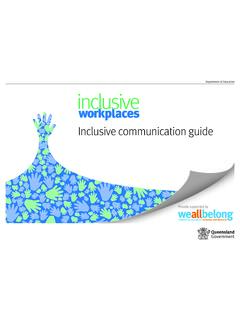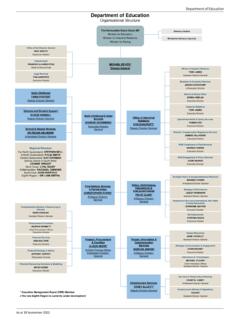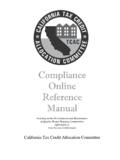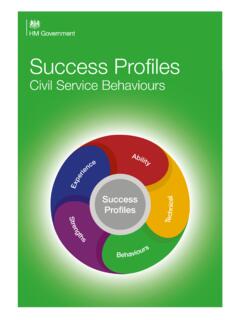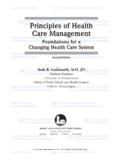Transcription of Standard of Practice February 2016 - Department of Education
1 Standard of Practice February 2016. 150189. Message from the Director-General One of the strengths of the Department of Education and Training is its employees' commitment to integrity and good governance. Our high Standard of ethical conduct is supported by this Standard of Practice , which provides guidance on the application to our daily work of the four ethics principles set out in the Public Sector Ethics Act 1994 and the Code of Conduct for the Queensland Public Service (the Code): 1. Integrity and impartiality 2. Promoting the public good 3. Commitment to the system of government 4. Accountability and transparency It is mandatory for all staff to read this Standard of Practice in conjunction with the Code and also to undertake public sector ethics training at induction and then regularly as directed by the Department . In that way we will ensure our clear understanding of and ability to implement the ethical principles, values and standards of conduct that are to be applied to our daily work in the Department .
2 Dr Jim Watterston Director-General Department of Education and Training Standard of Practice | February 2016. Contents Public sector ethics principles and Principle 1 Integrity and Declare and manage conflicts of Other (secondary) Contracting back to the Demonstrate a high Standard of workplace behaviour and personal Fitness for Conflict resolution ..5. Appropriate use of social media ..6. Personal use of Department facilities and Employee interactions with Exemptions ..8. Electronic communication between employees and Interactions with Leadership and supervisory Misconduct in a private Personal Principle 2 Promoting the public Principle 3 Commitment to the system of Principle 4 Accountability and Ensure diligence in public Public Interest Employee responsibilities in relation to the investigation of suspected Ensure transparency in our business Donations, sponsorship and Prizes and awards received in the course of Appointments to Use official resources, public property and facilities Using the departmental internet, intranet, and electronic Commercial use of departmental Ensure appropriate use and disclosure of official 19.
3 Post employment REFLECT - A guide for ethical Standard of Practice | February 2016. Introduction Queensland's Public Sector Ethics Act 1994 (the Ethics Act), sets out four ethics principles which are fundamental to good public administration. All public sector entities, and their employees, must promote these principles in their internal and external relationships. Each principle is strengthened by a set of values which describes behaviour that will demonstrate that principle. The principles and values are equally important. Public sector ethics principles and values Principles Values Commit to the highest ethical standards Manage conflicts of interest Integrity and Contribute to public discussion in an appropriate manner impartiality Manage participation in external organisations Demonstrate a high Standard of workplace behaviour and personal conduct Commit to excellence in service delivery Promoting the Ensure appropriate community engagement public good Work as an integrated service Commit to our roles in public service Commitment to the Maintain appropriate relationships with Ministerial staff system of government Ensure proper communication with Members of Parliament Ensure diligence in public administration Ensure transparency in our business dealings Accountability and Ensure appropriate use of official resources.
4 Public property and facilities transparency Ensure appropriate use and disclosure of official information Commit to innovation and continuous performance improvement The Code of Conduct for the Queensland Public Service (the Code), which describes how public sector employees are to conduct themselves in delivering services to the Queensland community, is based on the Ethics Act. As well as containing the ethics principles and values, the Code of Conduct contains standards of conduct for each ethics principle. This Standard of Practice (this Standard ) is a departmental publication which supports the Code. It provides further ethical guidance to departmental employees about applying the Code's principles, values and standards of conduct to our daily work. The Standard is supported by the Department 's Policy Framework. Standard of Practice | February 2016 1. The Policy Framework consists of policy through law, policy through government action, directives, standards, procedures, authorisations and delegations, guidelines and supporting documents.
5 All departmental policy instruments are available to staff and the public from the Department 's Policy and Procedures Register (PPR). Code of Public Conduct for the DET DET Policy Sector Queensland Standard of Framework Ethics Act Public Practice and PPR. 1994. Service Whole of Government DET. While this Standard covers a number of ethics-related issues that could potentially arise during your day to day employment , it is not able to provide guidance on every possible ethical scenario. If you feel you would benefit from further discussing the issues discussed below, or discussing any other ethical issue, please refer the issue to your supervisor, manager, principal or the Department 's Ethical Standards Unit. For ease of reference, the section numbering in this document aligns with the section numbering of the Code. 2 Standard of Practice | February 2016. Principle 1 Integrity and impartiality The Public Sector Ethics Act 1994 states: In recognition that public office involves a public trust, public service agencies, public sector entities and public officials seek to promote public confidence in the integrity of the public sector and: are committed to the highest ethical standards; and accept and value their duty to provide advice which is objective, independent, apolitical and impartial; and show respect towards all persons, including employees, clients and the general public; and acknowledge the primacy of the public interest and undertake that any conflict of interest issue will be resolved or appropriately managed in favour of the public interest; and are committed to honest, fair and respectful engagement with the community.
6 Declare and manage conflicts of interest A conflict of interest occurs where a conflict exists between our duty as public service employees to serve the public interest, and our personal interests. Conflicts may arise from a range of factors including personal relationships, employment outside the public service, membership of special interest groups or ownership of shares, companies or property. A real conflict of interest exists when a reasonable person, in possession of the relevant facts, would conclude that an employee's private interests interfere, or are likely to interfere, with the proper performance of their official duties. A perceived conflict of interest exists when it appears that a public official's private interests interfere with the proper performance of their official duties although, in reality, this may not be the case. A potential conflict of interest exists where there is no real or perceived conflict of interest apparent at the present time, but a scenario could allow for conflict in the future.
7 Examples of conflict of interest include: a public official who is in a position to authorise contracts for services and who has a direct or indirect private interest in the contracted company a public official who provides private sector consultancy services in a field of work which is the same as or in direct competition with their public sector role or a public official who allows their personal beliefs to interfere with the impartial implementation of government policy. Other (secondary) employment It is not prohibited to engage in other employment while employed by the Department , but there is an obligation upon all employees to ensure they demonstrate continued compliance with the Code and this Standard while doing so. Departmental staff engaged in other employment that falls within the parameters of the Notification of Other employment procedure must submit a Notification of Other employment form to their supervisor or manager.
8 If any conflict of interest exists related to their secondary employment , they must ensure it is resolved in the public interest. The Public Service Commission Directive 3/10 Declaration of Interest Public Service Employees (other than departmental Chief Executives) provides further clarification of matters which must be disclosed. There is also a specific directive for departmental Chief Executives (Directive 1/15) and a policy for Senior Executive Service or equivalent employees, based upon Directive 3/10. Standard of Practice | February 2016 3. If engaged in other employment while employed with DET, employees have an ethical obligation to ensure their ability to fulfil their departmental duties is not adversely affected by that employment and that their concurrent employment does not compromise the Department 's integrity. They must also ensure they do not use public resources, facilities, intellectual property or their position as a public official, to advance, promote or benefit their private interests either financially or in kind.
9 Employees must not engage another employee nor allow themselves to be separately engaged by the Department to provide goods or services that could reasonably be expected to be provided as part of their Standard paid employment . Example: Employee's secondary employment affecting their ability to fulfil their duties with the Department appropriate management In addition to performing full-time employment for the Department , an employee worked the pm to am shift as a taxi driver on three weeknights. The employee was observed seemingly asleep at various times during their working day. When the issue was raised by their supervisor, the employee explained they were experiencing significant financial difficulties. The supervisor assisted the employee to contact a financial counsellor and agreement was reached that the employee would only drive a taxi on Friday and Saturday nights. Contracting back to the Department Employees with private interests should be mindful that the law precludes them, in certain circumstances from being contracted to their employer.
10 Section 89 of the Queensland Criminal Code Act, 1899 states: Any person who, being employed in the public service, knowingly acquires or holds, directly or indirectly . a private interest in any contract or agreement which is made on account of the public service with respect to any matter concerning the Department of the service in which the person is employed, is guilty of a misdemeanour, and is liable to imprisonment for 3 years, and to be fined at the discretion of the court . If an employee is considering engaging in business with DET, it is incumbent upon them to seek advice before signing contracts or agreements which may breach the law. Managers or those officers responsible for the management of contracts with staff, who are already employed with the Department in any capacity, should seek advice from the Legal and Administrative Law Branch before progressing with the contract. 4 Standard of Practice | February 2016.



